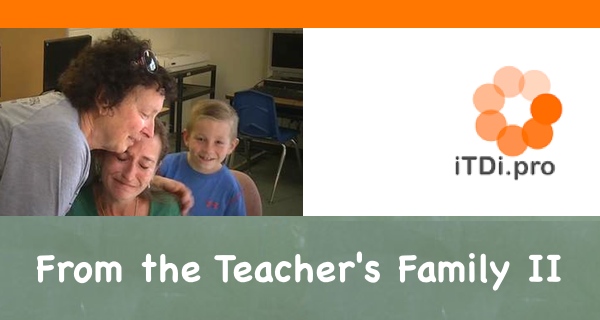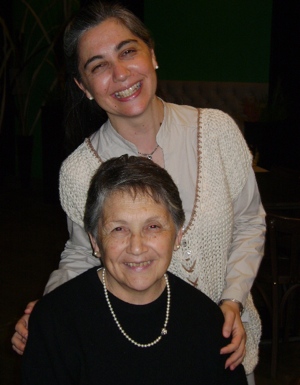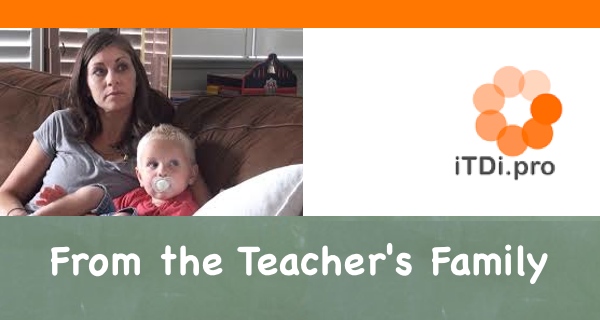 by Roseli Serra
by Roseli Serra
Family is what matters most to me in my life. It is and it has ever been like this. This is my heritage, passed to me from my parents and grandparents, who taught me strong family values, mainly about love, caring and being there whenever it’s necessary.
This semester I haven’t been as involved in social media and online learning and teaching because I was totally involved in my daughter’s wedding plans. Now, as my daughter is travelling after her wedding, I could only interview my husband and son.
I was very surprised and moved by their answers. To tell you the truth, I felt relieved too. When I gave up my career as a psychologist to become ‘only a teacher’, I was embracing a difficult career in a country where teachers are not as respected as they should be, are underpaid, have to study a lot and do extra work with no extra pay. And year after year, other benefits such as assistance with conferences, health insurance, and everything else has diminished or totally disappeared from public and private schools as well as language institutions.
Having said that, I am here to publicly say I am a blessed person. I‘m sure I would never have been able to do what I do, and have done for years, if not for the total support of my family. My husband not only supported my studies when I decided to become a teacher, he has encouraged me to go to conferences, to present, to write, to take risks and try the new. And he was a great dad when I had to live abroad for several months when our children were just kids. He took care of our children and made them understand that my absence was necessary to give them a better future.
As for my children, there are many stories I could tell that have to do with my job. They were very understanding and dealt with my long studying hours, lesson plan preparation, test correction and grading students’ papers at home. Thank you for supporting me emotionally. I have had awful moments as a teacher and as an educator, when I cried, when I could no longer believe it’s worth being a teacher. And then there was the time when I lost the job I loved and could not believe I would be able to recover from it. Thank you for being there, for supporting me, for showing me I have value, for teaching me and mainly for reminding me I’m not ‘only’ an English teacher .
And thank you Ayat for challenging me to interview my family and join my voice to the conversation. I feel honoured.
Interview with my son, Davi, a 25 year old political scientist:
Roseli: What are three good things about having a mother who is a teacher?
- She can remind me of a word that I do not recall
- She’s a great advisor not only for me but for my friends too.
- She made me like to learn English and then I learned other languages too and I think I like writing because of her.
Roseli: Was there ever a moment when you were very proud of something I did as a teacher?
I brag about it all the time.
Roseli: How do you think me being a teacher has made life more complicated for you?
I don’t. ON the contrary it has facilitated my life in many aspects!
Roseli: Do you think I am well suited to be a teacher?
Of course I do! Thousands of students cannot be wrong.
Roseli: What other jobs do you think I could have done or should have done aside from teaching?
Anything that has to do with being good with people. You help everyone and want to save the world sometimes.
Roseli: Why do you think I became a teacher?
Because you like to see others learning and because you like studying and learning too. I’m like you, aren’t I?
Roseli: Why do you think I continue to be a teacher now?
Because, despite everything, you still like what you do. But I remember there were times when you were happier as a teacher, right? I feel you have been so disappointed lately… It makes me sad.
Roseli: Do you have any message for teachers around the world who might read this post?
Take every student into consideration. A good teacher can change a life. A bad teacher too.
Roseli: Do you have any message for other family members of teachers around the world?
Be thankful.
II.
Interview with my husband, Franklin, a doctor (ophthalmologist) . We first met 37 years ago and have been married for 31 years.
Roseli: What are three good things about having a wife who is a teacher?
- She is also a learner. She says that “learning is an endless pro” I wonder if all teachers think the same way.
- She’s helped me with my medical stuff. I’m a doctor and I’m terrible at languages as well as at computers. She’s really good at both!
- Mainly because she loves what she does and does it very well!
Roseli: Were there ever a moments in your life when you wished I wasn’t a teacher?
Because the fact you’re a teacher has never had a negative side for me. On the contrary, it has helped me , my daughter and my son . A lot, by the way.
Roseli: Was there ever a moment when you were very proud of something I did as a teacher?
Many times. But mainly when I realised you are internationally recognised as an educator presenting in international conferences, writing materials with famous authors for international and respected publishers. And also when you your blog received an award after only four months of blogging and…many many times throughout all these years.
Roseli: How do you think me being a teacher has made life more complicated for you?
I don’t see any! How could I? I’m a doctor!
Roseli: Do you think I am well suited to be a teacher?
I do because you demonstrate excitement and happiness when you are simply preparing a lesson. It makes me happy because, like me, you love what you do. If you are happy, I’m happy.
Roseli: Why do you think I became a teacher?
Because you were not happy being only a psychologist in a closed office or hospital. I remember you feeling very sad because you wanted to help people learn and when I saw you teaching private lessons at our first house, your eyes shined like stars.
Roseli: Why do you think I continue to be a teacher now?
Because of your natural skills as a teacher and as an educator. But I also think you feel tired and lately, often, you are not happy because you want to fix things you cannot. In addition, you are really underpaid. Teachers are underpaid in our country and not valued as they shoud be. What a shame!
Roseli: Do you have any message for other family members of teachers around the world?
Be proud of them. Be patient with them. Support them always. They carry the world upon their shoulders. Never forget it!




 Maria: In what aspects do you think Education has changed from when you were a teacher to today?
Maria: In what aspects do you think Education has changed from when you were a teacher to today?
 by Theodora Papapanagiotou
by Theodora Papapanagiotou
 by Roseli Serra
by Roseli Serra



